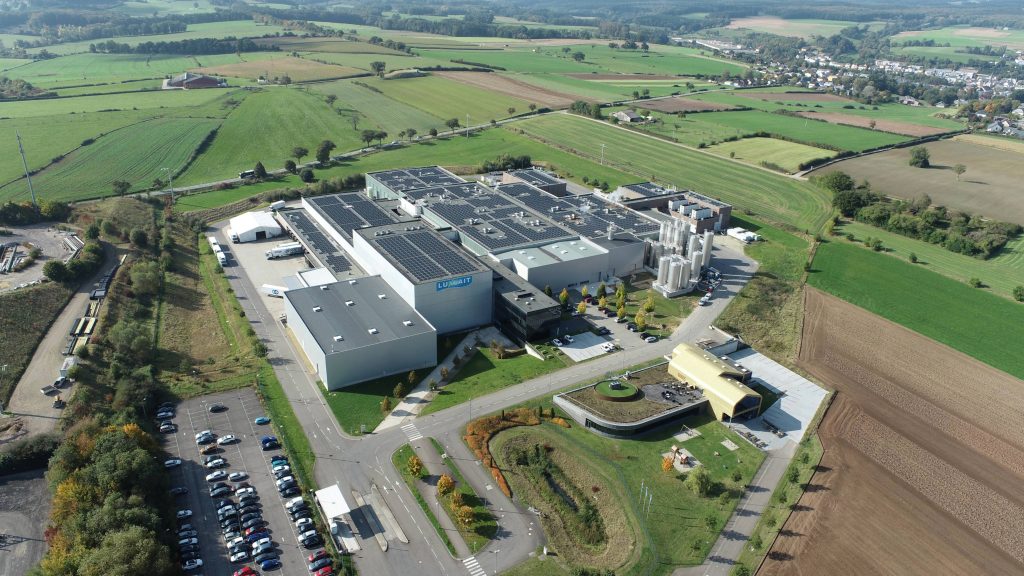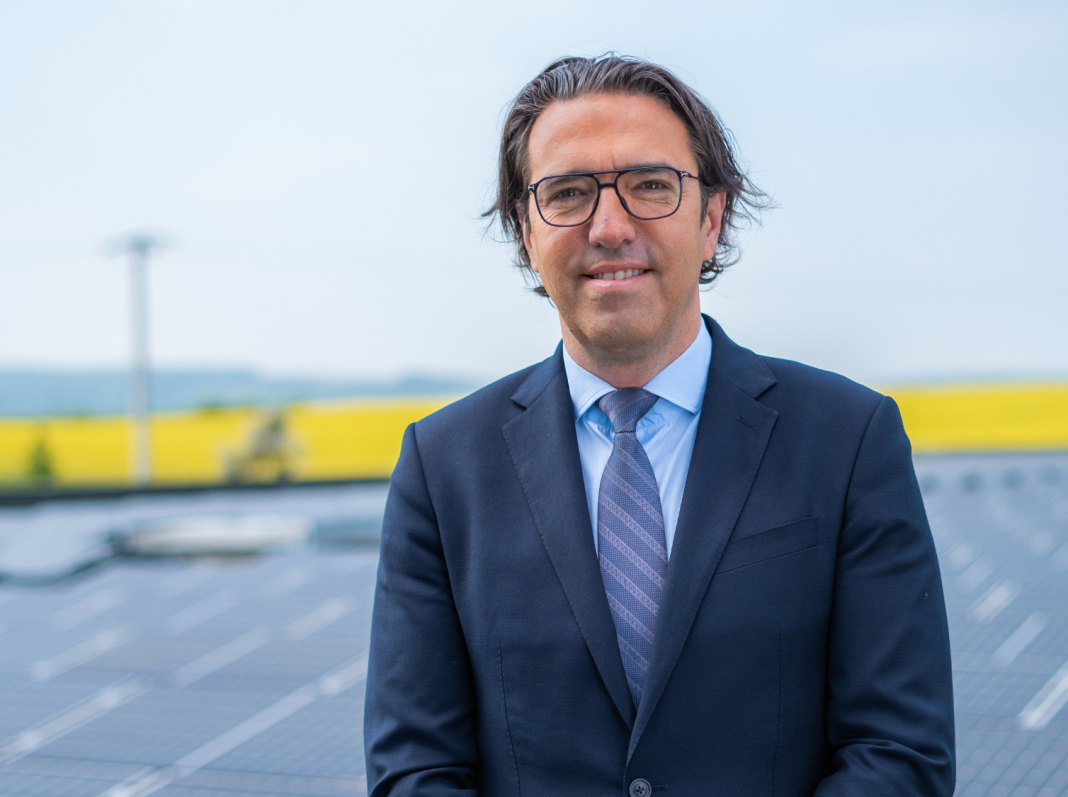For over 130 years, Luxlait’s products have figured into Luxembourg’s quality food scene. With new developments underway, CEO Gilles Gérard describes the company’s commitments to sustainability and innovation.
Despite being more than 130 years old, Luxlait has managed to continuously innovate, be that through investments in cutting-edge technology or developing new products. Since 2018 alone, it has developed over 50 new products, bringing today’s total to more than 480.
And it has exciting developments in the pipeline: it will be investing in a factory for mozzarella (grated and balls) and a new ice cream department. It’s also planning to begin making protein-enriched products. Additionally—and perhaps even a bit surprisingly for a dairy company—it’s going to launch plant-based dairy alternatives. All of this to keep up with customer expectations and market demands.
Luxembourg foothold, international presence
The company got its start in 1894 under the name “Central-Molkerei” with a mission to supply dairy products to people in Luxembourg. Another milestone was in 1978, when the remaining farming associations merged, forming the Luxlait we know today. The company daily collects more than 180 million litres of milk and processes around half a million litres of milk, thanks to the help of the 300 dairy farmers (and their 25,000 cows) in addition to its staff of around 400.
Gilles Gérard, who became group managing director in 2018, has been with the company for a good chunk of its history, having started nearly 30 years ago as a project engineer. He quickly became project and technical manager, a role which allowed him to oversee a number of projects, including the development of one of the most modern plants in Europe to the tune of more than €160 million in 2009. He talks about his “commitment and passion for the dairy industry” and how many of the Luxlait products figure as staples amongst locals, even part of their memories growing up…
Since taking on his current role, he says he’s focused on “corporate strategy, innovation, sustainability and expanding our presence on the international market.” Luxlait today sells around 35% of its products domestically; the other 65% are exported mainly to France, Germany, Italy, Spain and the Netherlands. Smaller volumes are also exported to the Middle East, China and Africa, although Luxlait tries to concentrate these in order to further reduce its own current footprint. Particularly popular has been its range that focuses on products of the world, including skyrs, kefir, cottage cheese, fermented milks, and more.
Industry challenges
Gérard’s current role has not been without challenges, however. “The greatest challenge has been to navigate through global economic uncertainties while maintaining Luxlait’s growth and innovation,” he explains, citing not just the war in Ukraine, the covid-19 pandemic and geopolitical uncertainties, but also “the end of milk quotas where we had a major influx of additional milk of almost 40% in a few years, which we know we have to make the most of.”
“The end of milk quotas where we had a major influx of additional milk of almost 40% in a few years, which we know we have to make the most of”
He adds that there are also fewer farmers and for those remaining, their challenges include “fluctuating milk prices, of course, increasing regulatory requirements via European directives and the impacts of climate change.” Gérard is part of several associations, including the European Dairy Association, where he currently serves as vice president and can help raise the concerns of farmers and others in the industry.
Luxlait has, of course, also been impacted by regulatory requirements. As part of its Single-Use Plastics Directive, the EU mandated that plastic caps had to be attached to bottles containing three litres or less, which entered into force in July 2024. It was a move that caused many European consumers to take to social media, complaining about leaks or spills with the new system.
“Someone who throws away the [plastic] cap [would] also throw away the packaging”
When specifically asked about the tethered caps, Gérard says he didn’t fully understand the logic behind it, adding: “someone who throws away the [plastic] cap [would] also throw away the packaging.” But he goes a step further, adding that the adaptations to machines and movement of people cost “hundreds of thousands of hours” and “a lot of money”. Machine parts had to be discarded, since they were no longer useable with the new system.
Nevertheless, Gérard faces these challenges head-on. “I’m honoured to be part of this history and to contribute to the company’s growth… in eight years, we’ve grown our turnover by more than 60% while making higher profits, and I’m very proud of that too.”
Values for success
To ensure what it calls “uncompromising quality”, the company makes products from 100% Luxembourg milk and carries out more than 2,000 analyses each day. Luxlait guarantees the milk doesn’t stay in the silo longer than 24 hours. It has invested more than €50 million over the past eight years to optimise production, keep up with cutting-edge tech and reduce its carbon footprint. Keeping up with supply and demand for products with a relatively short shelf-life can be challenging too, but Luxlait also has a network of food banks to which it can provide in the case of oversupply.
As Gérard notes, with Luxlait’s presence in Roost-Bissen, the geographical centre of the country, the company has a low footprint for its collection. Luxlait points out that a total of around 850,000km are travelled for collecting 180 million litres, which translates to around 0.004 km/l.
“As well as sustainability, the values of quality, traceability and respect for local producers have been fundamental to Luxlait’s success,” Gérard notes. In terms of sustainability, for instance, Luxlait has installed photovoltaic panels, reduced its own plastic packaging, has its own wastewater treatment plant and 50 waste-sorting plants, to name a few measures. In 2024, Luxlait also invested €15 million in a production line in a bid to use “even more environmentally-friendly packaging”.
“We are also continually working to improve the energy efficiency of our facilities,” Gérard adds. “We have reduced steam consumption by 30% in two years, and we continue to promote biodiversity on our farmers’ land.”
Gérard also notes the need for transparency to meet customer expectations and stay ahead in the industry. In 2011, Luxlait also made a €8 million investment in its interactive discovery centre, Vitarium. It’s a place where children and adults alike can learn more about the dairy industry and fun activities, like cooking studios, can be organised. “Among other things, the Vitarium enables visitors to understand the dairy production process, from farm to table, and to discover the importance of quality and sustainability in our industry,” Gérard says. “The factory can be visited in its entirety, demonstrating that Luxlait is a transparent company.”

This article was published in the 6th edition of Forbes Luxembourg magazine.
Read more articles:
Luxembourg Business Climate: Between Slight Improvement and Fragility

